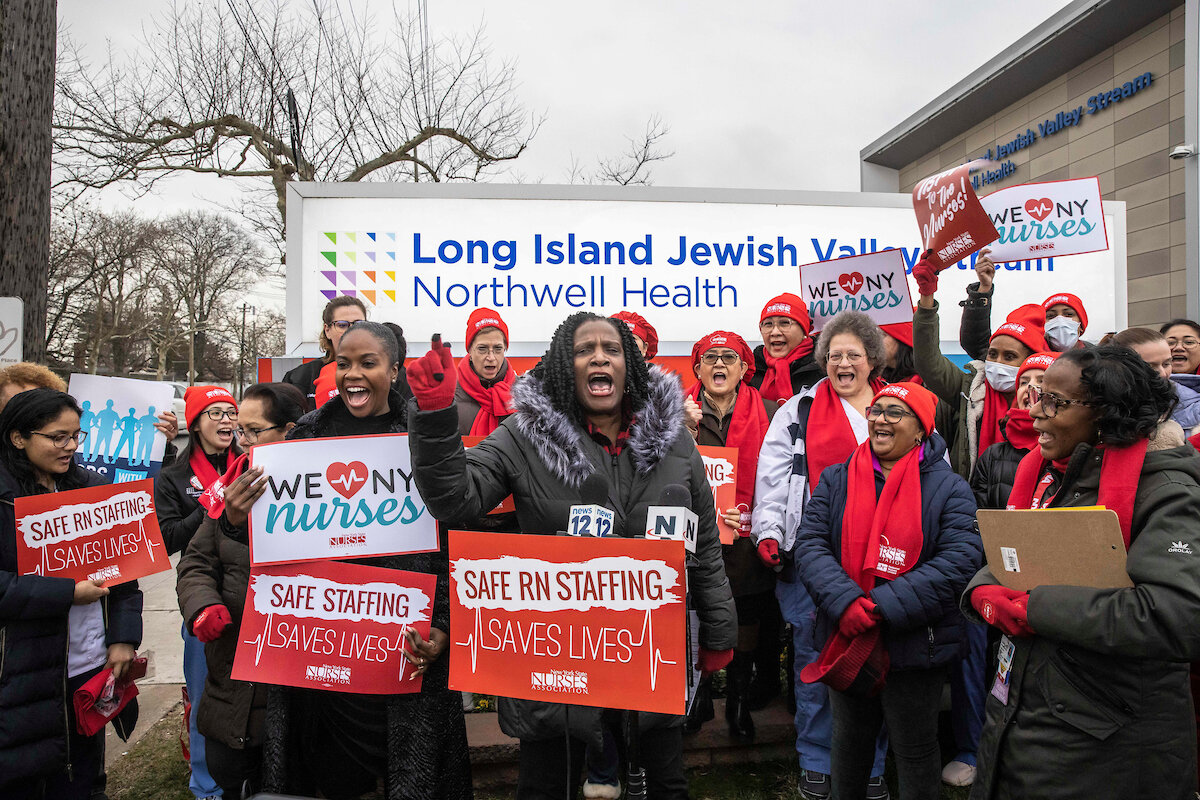Here's why Long Island Jewish-Valley Stream nurses are poised to strike
Editor's Note: Long Island Jewish-Valley Stream nurses are voting Feb. 20 to avert a potential walkout staged for tomorrow, Feb. 21, after reaching a tentative contract agreement with Northwell. More updates to follow.
Hundreds of nurses at Long Island Jewish-Valley Stream hospital are threatening to walk off on the job on Feb. 21 unless negotiators and hospital administrators agree on a new contract. The New York State Nurses Association authorized a strike against the Franklin Avenue facility earlier this month.
“We would prefer to be inside the hospital caring for patients than out on the picket line,” union members said, in a statement. “Even if we exercise our rights to a work stoppage, we urge patients to not delay seeking medical care.”
Northwell Health, which operates the Valley Stream hospital, told the Herald that while it is “disappointed in NYSNA’s decision to issue a strike notice,” the organization remains “optimistic that an agreement can be reached.”
“Our goal is to reach an agreement that continues to provide our valued nurses with competitive compensation and benefits,” Northwell Health said, “and ensures a safe, supportive, working environment.”
If the strike does happen, it will start Feb. 21 at 7 a.m., potentially causing a host of disruptions, postponements, and delays in care. It also could potentially place enormous strain on the hospital’s critical operations, according to registered nurse and negotiator Sandra Marion-Armstrong.
Yet, a strike won’t mean there won’t be health care professionals on hand to work with patients. Northwell is expected to mobilize traveling nurses not affected by the strike to act as stand-ins, according to a nurse at Northwell who is not directly involved in the contract negotiations.
Whether that will happen, however, Northwell officials remain tight-lipped.
“In the event of a strike, patient care remains our highest priority,” Northwell officials said, in a statement. “We will continue to serve our patients and our community by providing uninterrupted world-class care.”
What nurses want
Central to the union’s demands are fairer patient-to-nurse staffing ratios and higher compensation for its nurses.
Nurses are seeking a 19 percent pay increase over the next three years, according to reports. Northwell is said to have countered with a 3 percent pay bump in the first year, followed by slightly larger raises over the next two years.
The union says it wants to address a lack of adequate staffing by having “safe staffing ratio” guidelines explicitly outlined in future contracts.
“Our nurse-to-patient ratio is 1-to-8,” Marion-Armstrong said. “That’s one nurse taking care of eight patients for 12 hours. It’s physically exhausting and does a disservice to patients.
“We’re looking for a 1-to-5 ratio for our telemetry nurses who have to constantly monitor patients. And 1-to-6 for the regular floor nurses.”
It’s a matter of patient safety, she added.
“Nurses don’t have time to converse with patients and answer questions, which is important,” Marion-Armstrong said. “We have nurses who, after their shift, take an hour just to fill out documentation because they’ve been dealing the whole day with patients in need of intensive care. And sometimes we deal with violent patients.”
Marion-Armstrong is not as optimistic as Northwell there will be a resolution in time, saying that while sides continue to talk, negotiations that began last October have reached an impasse. Meanwhile, nurses have been working without a contract for more than a month.
A health care hiring crisis
Healthcare worker strikes have popped up around the country with unions haggling over benefits and safeguards to solve the problem of what unions are calling too many patients versus too few staffers.
The Long Island Federation of Labor and 22 labor unions stood behind the union in a letter sent to the desk of Northwell Health chief executive Michael Dowling, saying that hiring enough people and paying their workers better is needed “to recruit and retain nurses,” while providing them a sense of “stability” that allows them “to remain focused on safe patient care.”
“At a time when hospital CEO and executive pay is out of control, it is unconscionable that our health care heroes would not be paid fairly with safe working conditions,” said labor federation president John Durso. “Long Island is facing a crisis in hiring and retaining health care workers.”
While the short-staffing problem was exacerbated by the coronavirus pandemic of recent years, Marion-Armstrong said nurses’ frustrations of being overworked and overburdened have been a long time coming.
“There are nurses who have come and gone within six months,” she said. “Some nurses have come crying every day. They don’t know how much they can take. They don’t want to stay.
“We need Northwell to do something.”
Have an opinion on this article? Send an email to jlasso@liherald.com







